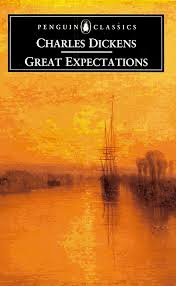Our book group choice for November 2008 is Great Expectations by Charles Dickens. Dickens’s magnificent novel of guilt, desire, and redemption.
Great Expectations is a novel by Charles Dickens, set in Kent and London in the early to mid-19th century. The novel tells the story of Philip Pirrip (Pip), an orphan who is apprenticed to the village blacksmith Joe Gargery. Pip’s life is changed forever when he is visited by an escaped convict, Abel Magwitch, who asks Pip to bring him food and a file. Pip complies, and Magwitch is later captured. However, Magwitch repays Pip’s kindness by secretly becoming his benefactor, providing him with the money to go to London and become a gentleman.
Pip arrives in London with high hopes, but he soon realizes that life as a gentleman is not all that it is cracked up to be. He is lonely and isolated, and he misses his old life in the marshes. He also begins to question whether Magwitch is truly his benefactor, and he is shocked to learn that the convict is actually the one who has made his dreams come true.
Pip’s life is further complicated by his love for Estella, the beautiful but cold-hearted ward of Miss Havisham. Estella has been raised to be a heartless coquette, and she treats Pip with disdain. Pip is determined to win her love, but he eventually realizes that she is not the woman he thought she was.
After many years of hardship and disappointment, Pip finally comes to terms with his past and his true identity. He realizes that he does not need to be a gentleman to be happy, and he returns to the marshes to be with Joe and Biddy, the two people who have always loved him for who he is.
Themes
- Great Expectations explores a number of themes, including:
- The nature of good and evil
- The importance of family and friendship
- The power of money
- The importance of self-discovery
- The novel also examines the social class system of Victorian England, and the ways in which it can both restrict and enable people.
Discussion Questions
- What is the significance of Philip Pirrip’s nickname, “Pip”?
- What do you make of Dickens’ characterization of the convict who accosts Pip on the marshes? Is he a purely sinister character or are we given the sense that he has some redeeming qualities?
- Are there any similarities between Pip’s relationship with Joe and the one he forms with Miss Havisham?
- What is the significance of Herbert Pocket giving Pip the nickname “Handel?”
- What is the effect of our learning the story of Miss Havisham’s aborted marriage in retrospect from Herbert Pocket?
- As the adage goes, “A man’s home is his castle,” and in the case of Wemmick, this is literally true. How is the relationship between Wemmick and the Aged different from, or similar to, other relationships between the young and the old in the novel?
- One of the central preoccupations of the novel is the whole question of what it means to be a gentleman. At this point in the story, is this an appropriate term with which to define Pip? Why or why not?
- Compare and contrast Pip’s encounter with Magwitch on the marshes to his re-encounter with him later.
- How does Magwitch’s disclosure about his past dealings with Compeyson change your perspective regarding him?
- What point is Dickens attempting to make through the inclusion of the rum-drinking, gout-afflicted Old Bill Barley?
- One of Great Expectations’ most striking images is that of fire. Discuss its symbolic importance in the novel.
- Discuss the strengths of Dickens’ description of the scene in which Pip, Magwitch, Startop, and Herbert are overtaken by Compeyson and the authorities.
- What purpose is served by having the episode of Wemmick’s marriage to Miss Skiffins come almost directly after the recapture and incarceration of Magwitch?
- Does the end of the novel provide us with a strong sense of closure? What, if any, are its ambiguities concerning Pip and Estella?

